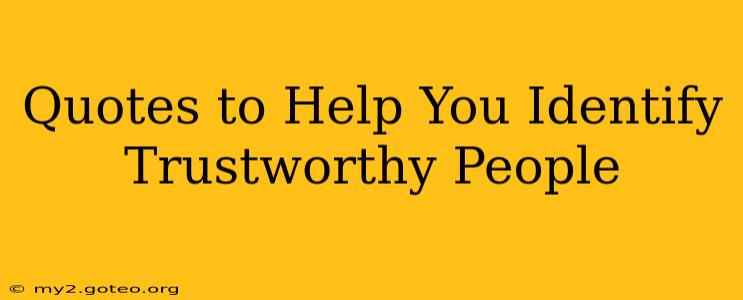Identifying trustworthy individuals is crucial in both our personal and professional lives. While there's no foolproof method, certain behaviors and characteristics consistently signal trustworthiness. This article explores insightful quotes that highlight key aspects of trustworthiness, offering a deeper understanding of how to recognize reliable people. We'll also delve into common questions surrounding trust and provide practical advice.
What Makes Someone Trustworthy? (Addressing the Core Question)
Trustworthiness isn't merely about the absence of dishonesty; it's a multifaceted quality encompassing integrity, reliability, and empathy. It's built upon consistent actions, transparency, and a genuine concern for others. Many insightful quotes capture these nuances:
-
"The best mirror is an old friend." – George Herbert: This quote emphasizes the long-term perspective of trust. True trustworthiness is revealed over time, through consistent actions and sustained relationships. Old friends, having witnessed various facets of a person's character, provide a reliable reflection of their trustworthiness.
-
"Trust is like a vase. Once it’s broken, it can never be quite the same." – Anonymous: This poignant observation underscores the fragility of trust. While it can be rebuilt, it requires significant effort and a demonstrable commitment to rectifying past breaches. The initial sense of security is often irretrievably lost.
-
"Character is what you are in the dark." – Dwight L. Moody: This emphasizes the importance of integrity. A truly trustworthy individual acts ethically even when no one is watching, demonstrating consistent moral behavior regardless of external pressures or potential consequences.
How Can I Tell if Someone is Truly Trustworthy? (Addressing Common Concerns)
Many people grapple with accurately assessing trustworthiness. The following sections address frequently asked questions.
What are the signs of a trustworthy person?
Trustworthy individuals demonstrate several key characteristics:
- Honesty and Integrity: They are truthful in their words and actions, consistently adhering to ethical principles.
- Reliability and Consistency: They follow through on their commitments and maintain consistent behavior over time.
- Empathy and Compassion: They demonstrate genuine concern for others' well-being and feelings.
- Transparency and Openness: They are open about their intentions and actions, avoiding secrecy or deception.
- Accountability: They take responsibility for their actions and mistakes, rather than making excuses or blaming others.
How can I build trust with someone?
Building trust is a reciprocal process. It requires consistent effort, vulnerability, and mutual respect. Key steps include:
- Be transparent and honest: Share your thoughts and feelings openly and honestly.
- Keep your promises: Follow through on your commitments, big and small.
- Listen actively: Pay attention to what the other person is saying and show genuine interest.
- Be reliable: Be someone they can count on in times of need.
- Show empathy and compassion: Demonstrate that you care about their well-being.
Are there any specific questions I can ask to assess trustworthiness?
While there's no magic question, asking open-ended questions that probe their past actions and decision-making can offer insights. For example:
- "Tell me about a time you had to make a difficult decision. What was your thought process?"
- "Describe a situation where you had to overcome a significant challenge. What did you learn from it?"
- "How do you handle disagreements or conflicts?"
These types of questions reveal their problem-solving abilities, ethical compass, and how they handle pressure. Pay close attention to their responses, body language, and overall demeanor.
How do you know when you shouldn't trust someone?
Red flags indicating potential untrustworthiness include:
- Inconsistency: Their words and actions frequently contradict each other.
- Secrecy and evasiveness: They are reluctant to answer questions or provide details about their lives.
- Lack of accountability: They consistently avoid taking responsibility for their mistakes.
- Manipulative behavior: They attempt to control or influence others through deception or coercion.
- Breaking promises consistently: Their word is unreliable.
Trust is earned, not given. Take your time to assess individuals, observe their actions over time, and trust your instincts. By understanding the multifaceted nature of trustworthiness and paying attention to the signals, you can significantly improve your ability to identify and build relationships with reliable people.

